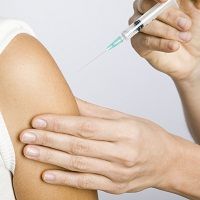Article
Shingles Vaccine Relieves Pain Regardless of Effectiveness, But Only for One Gender
Author(s):
While most cases of shingles typically clear up in a matter of a few weeks, the condition has the ability to cause long-term problems.

While most cases of shingles typically clear up in a matter of a few weeks, the condition has the ability to cause long-term problems.
Postherpetic neuralgia (PHN) is a painful complication of shingles that lasts longer than the disease. Lead author Hung Fu Tseng, PhD, MPH, and his colleagues from Kaiser Permanente found that even if the shingles vaccination does not prevent the disease, it can provide stop longstanding pain from developing — including the kind caused by PHN.
“Our study found that the shingles vaccine has an added protective benefit of reducing the risk of PHN for a vaccinated individual who still experiences shingles,” Tseng, of the Department of Research & Evaluation, said in a news release.
Documented in The Journal of Infectious Diseases, the study included 2,400 patients with herpes zoster (HZ) — the same virus that causes chickenpox – over the age of 60. Half of the participants received the shingles vaccine while the other half did not. Pain associated with HZ was analyzed in each patient at the one, 2, 3, and 6-month marks.
Out of the vaccinated group who still got shingles, 4.2% of women also got PHN whilethat number jumped to 10.4% for unvaccinated women. On the other hand, out of the vaccinated group who still got shingles, 6% of men also got PHN while that number slightly decreased to 5.8% for unvaccinated men.
“Among persons experiencing HZ, prior HZ vaccination is associated with a lower risk of PHN in women but not in men,” the authors explained.
A concrete answer for this gender difference in results has not been identified. However, the researchers suspect that men and women go about chronic pain treatment differently and this area “deserve[s] further investigation.” The team noted that the older the patient with HZ, the more severe the pain is likely to become and the higher the chance of being accompanied by depression, fatigue, and other symptoms.
“Hopefully, this study will encourage more people to get vaccinated in order to reduce the long-term pain and potential disability associated with shingles,” Tseng concluded.





